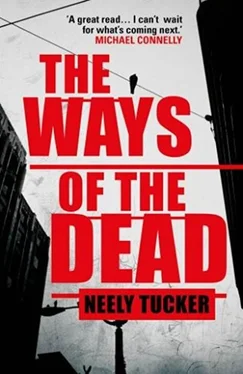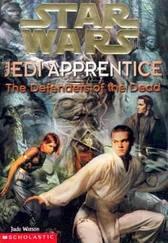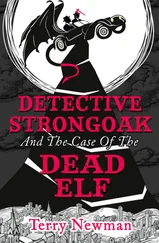“Just you try busting me,” he said, leaning closer to her, whispering back, smiling, pure malice now. “Go the fuck ahead. Walk into your boss’s office, good old Eddie back there, and explain assigning your best reporter to babysit a presser ’cause you thought it brilliant to have a twenty-seven-year-old newbie on the cop beat get bitchslapped by the New York Times .”
She broke her gaze and leaned back, to defuse at least the appearance of a scene. “Okay, Sully. Look, it’s late. Everybody’s tired. Let’s just cool off and-”
“You’ll get your presser,” he cut in, his voice ragged. “And in the next twenty-four to forty-eight? You’ll be eating this. Be a sweetheart when you do.”
He managed to make his feet turn and walk, the walls seemed to vibrate, and the thundering in his ears was so loud that he had to blink it back.
When he got to the hallway and reached for the elevator button, his thumb was trembling.
When he blew in the door, Dusty had called, and that was just fucking great. He listened to the voice mail- Call me, it’s been too long, what’s the deal? -and decided to ignore it. The blackness, the bile-she wouldn’t understand and he couldn’t explain. He poured Basil’s over ice, skipped the splash, and opened the Dutch door to the backyard, sitting on the steps.
He blinked and looked at the cherry tree, trying to slow his breathing the way the doctors had taught him: Focus, focus on something small. The tree, the tree. It would be shedding leaves in a matter of weeks. The chill in the air would stay. The ghosts in his head would leave. Winter would descend. He listened to the traffic passing on Constitution and his chest slowed. He held out his hand. The tremors were almost gone.
He went back inside, got the bottle and went upstairs. The shelf in the closet held the box, the kind of storage box law firms used to use for case files. He took it to the bed, unwrapped the silk drawstrings, turned it upside down, shaking it out onto the top of the sheets.
Pictures, old passports, documents in foreign languages, wrinkled currencies in faint shades of blue. Nadia’s scarf. He climbed on the bed, propping the bourbon against a pillow. There were several sets of pictures from Bosnia, bound together with a green rubber band, and he sorted through them until he found the packet he was looking for. He pulled the rubber band off and the pictures spilled out. They were taken at the school and they were poorly lit and Nadia wasn’t the subject of most of them because he did not know her then.
The story had been about an elementary school that was functioning in the basement of an apartment building during that first winter of the war, populated by children of parents who’d stayed behind by choice or necessity now that the routes into and out of Sarajevo were blocked. The siege had a surreal quality to it. The drudgery of the war, the intermittent shelling, the bread lines, the snipers, gasoline at a hundred dollars per gallon, twenty-five dollars for a bar of chocolate, had not yet settled in.
The school was composed of fifty-six children from six grades, being taught-if that was the verb-by three teachers. It seemed to Sully more like a lesson in crowd control. The children were aggressive, loud, anxious. They stood when they were supposed to sit, they ran when they were supposed to walk, they threw things. They were wildly energized by a foreign reporter dropping in, and this gave cause for more noise and frenzy. Children had never done much for him, and Sully had been of a mind to pop them upside the head and tell them to pipe down. His old man hadn’t been wrong about everything.
The two other teachers were older, maybe early forties, and Nadia, a decade younger, was the quiet one who didn’t say much. She taught the youngest children. He had been struck, immediately, by her genuineness and warmth (well, her eyes, too, a deep, honeyed shade of brown) and, after a few minutes of conversation, the sly wit, the rough voice (she smoked).
That first day, snow had just fallen. Where were the pictures…? Here. Here she was, blue cable-knit sweater, jeans, boots. Black hair, loose, free. The kids surrounded her, excited by the camera, mugging. A kid named Sasha put his head on her shoulder as she sat at her desk. Here she was in teaching mode, writing on a whiteboard, one arm drawn across her chest to keep her coat close in the near freezing air.
A month passed before he saw her again. He took her a copy of the story, a version that had been picked up and run on the front page of the International Herald Tribune . By then four kids in her class were dead and they had moved the classroom twice. He saw her in the Merkale Market, too, just long enough to say hello. Two weeks later, he saw her there again. She lingered, standing outside next to a table scattered with anemic vegetables, a pale winter sun barely over the mountains, her skin white as parchment, a cigarette in her left hand. His voice nervous, he couldn’t help it he said hi and hello and then just did it.
– So maybe could I take you to dinner or something sometime? I could-
– Nobody goes to dinner. Only foreign novinari and UNPROFOR.
– Okay. I wasn’t trying to-
– You can come over if you want pasta.
– ’m sorry?
– Pasta. Do you eat it?
– Yes, yes, but-
– Is English one of your languages?
– Yes.
– So you know, come over, eat pasta.
Teasing him in that Balkan accent, that world-weary Euro air, looking at him now, those eyes.
– Yes. I can. I can come over. I got two bottles of red from duty-free.
And so it had proceeded in the speeded-up hyperreality of war. Before the calendar turned to February, they were making love, on her bed, on the couch, on the carpet in front of the couch. He put her on her knees in front of the couch and neither of them lasted long like that. Pillow talk:
– You like Yugoslav girls?
– I don’t know that I’ve sampled the lot. But this one, touching the tip of her nose with his index finger, yeah, I like this one. But I thought you guys were Bosnian now.
– I was Yugoslav when I was born. Tito said we were all Yugoslavs.
– Tito’s dead. Yugoslavia’s dead.
– It does not change what I am. You, you’re American. From the south part?
– Louisiana.
– What do they do in Louisiana? Loo-ee-see-anna .
– Fight. Fuck. Play football. Fish.
Giggling, brushing her hair back from her face, propping her head on her elbow, the muslin-thin moonlight streaming across the room behind her. There were the hills in the distance, a deeper dark than the sky above it. He could see them behind her. She was a shadow, a shape, and she possibly had the most beautiful voice he had ever heard.
– Only things that start with the ‘F’?
– Okay, okay. They cook. They speak English funny. They go to church, a lot of them, anyway, Catholics and Baptists, not Orthodox. They teach you to shoot before they teach you to drive. Manners. Most of them have manners, unless you’re being an asshole, and then they don’t. Then they really don’t.
– And your parents?
– They’re dead. Like Tito.
– They were Louisiana?
– Yeah.
– So you would stop being Louisiana if they called it something else?
By summer, they had progressed to the point where he’d stay with her when he was in the city. They talked of him hiring her as his interpreter and trying for a visa, issued by UN forces that were running the airport, to come with him past the siege lines. But they both knew that would not work, and the idea sank into the gloom of the apartment in the late evenings. There was nothing but candlelight and books and their conversation filling the long hours. She read Bulgakov, reread Gogol, she got him to read Ivo Andric. She read Günter Grass, she read the García Márquez and the Faulkner he’d bring. She read an Elmore Leonard book in a single evening, trying out the slang, working on her accent.
Читать дальше












